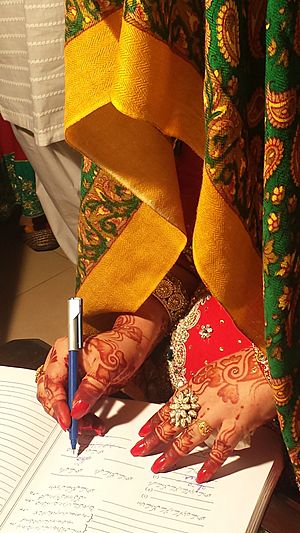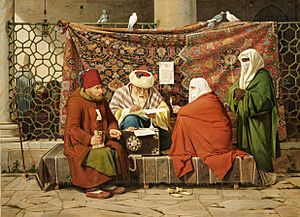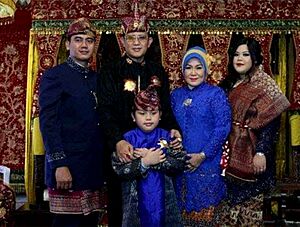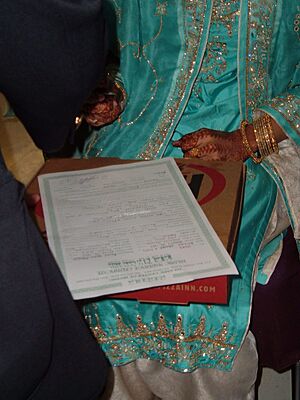Marriage in Islam facts for kids

In Islam, nikah (Arabic: نِكَاح) is a special agreement between two people who want to get married. Both the person getting married (the groom) and the person getting married (the bride) must agree to the marriage freely. This agreement, whether spoken or written, is very important for a marriage to be valid in Islam. It explains the rights and duties of both the husband and the wife.
Sometimes, there are other types of marriages. One is called zawāj al-mut'ah (temporary marriage). This is allowed only by some Shi'ite Muslims for a set time. There is also Nikah Misyar, which is a non-temporary marriage where some usual conditions, like living together, are changed. Some Sunni scholars allow this.
Contents
- What Does Nikah Mean?
- How Marriage Changed with Islam
- Why Marriage is Important in Islam
- What You Need for an Islamic Marriage
- Rights and Duties in Marriage
- Marriage Agreements and Forced Marriages
- Divorce in Islam
- Marriages That Are Not Allowed
- Having More Than One Wife
- Waiting Period After Divorce or Death
- Islamic Marriage Today
- Images for kids
- See also
What Does Nikah Mean?
In Islamic law, the marriage agreement is called nikah. This word is used in the Quran to mean the marriage contract. The word nikah means "marriage" or "marriage contract."
In countries where Arabic is spoken, marriage is often called zawāj. This word comes from zawj, meaning "a member of a pair." The marriage contract itself has different names. For example, in Arabic, it's ʿaqd al-qirān, meaning "matrimony contract." In Urdu, it's Nikāḥ-nāmah. The wedding party can also have different names, like shaadi in Urdu or düğün in Turkish.
How Marriage Changed with Islam
Before Islam started in the 7th century, there were many ways people got married in Arabia. Some marriages were by agreement, some by capture, and some by inheritance. Women often had little say in their marriages. They rarely had a contract or control over their children. Their agreement was not often asked for.
When Muhammad brought Islam, he changed these old rules. Marriage by inheritance was stopped. The Quran shared new rules that made marriage fairer.
Before Islam, men could marry and divorce as many times as they wanted. Islamic law limited men to four wives at one time. The woman became a more important partner in the marriage. For example, the dowry (money or gifts) was no longer just for the father. It became a gift for the wife to keep as her own property.
Under Islamic law, marriage became a "contract" instead of just a "status." The main parts of this contract were:
- An offer from the man.
- An acceptance from the woman.
- The payment of a gift to the bride (called mahr).
The woman's consent was always needed. This could be given actively or by her silence. Also, the offer and acceptance had to happen with at least two witnesses present.
Why Marriage is Important in Islam
Marriage is highly encouraged in Islam. Family life is seen as a "blessing" and brings stability. The Quran has verses that encourage marriage to prevent bad behavior. For Muslims, marriage was created by Allah (God) to build strong families and a good society.
What You Need for an Islamic Marriage
Islamic marriages need a few things to happen:
- Agreement: Both the groom and the bride must agree.
- Guardian's Consent: The bride's guardian (called a walī) must also agree. The walī is usually a male relative, like her father. The walī must be a free Muslim. If the bride is Christian or Jewish, her guardian should be from her own faith.
- Bride's Presence: The bride is usually there when the marriage contract is signed.
In some traditional views, if a bride is silent, it is seen as her agreement. However, the bride's consent is always required. The marriage is then announced publicly. This is called iʿlān. A responsible person gives a talk to guide the couple. It is not required for this person to be a religious scholar, but it is common. After the ceremony, there is usually a celebration with family and friends.
Important Conditions for Marriage
There are several key conditions for an Islamic marriage:
- Contract and Gift (Mahr): A marriage must have a contract and a special gift of money or property given to the bride. This gift is called the mahr. The husband must pay the mahr to the bride. It is for her to use as she wishes. There is no "dowry" in Islam, which is money paid to the groom from the bride's family.
- Chastity: Both partners should be chaste. If someone has committed sins, they should truly regret them before marriage.
- Religion: A Muslim man can marry a chaste Muslim woman or a woman from the People of the Book (Jews, Christians). But he cannot marry women who worship idols. For Muslim women, marrying men from the People of the Book is not clearly allowed.
- Bride's Permission: A virgin bride cannot be married without her permission. If she is too shy to speak, her silence can be seen as agreement. However, forced marriages are against Islamic teachings. If someone is forced into marriage before they are old enough, they have the right to cancel it later.
- Guardian's Role: Different Islamic groups have different ideas about the walī's role. Some believe the bride can sign the contract herself if she has reached puberty. Others believe a walī is always needed for a virgin woman.
Rights and Duties in Marriage
In Islam, both husbands and wives have rights over each other. The husband is usually expected to support the family financially. This means providing a home, food, and clothes. The wife is expected to look after the husband's property and how money is spent. If the wife has her own money or property, she does not have to spend it on her husband or children. The husband has no right to her property unless she agrees. The mahr (gift to the bride) is part of the husband's financial duty.
If a husband is not fulfilling his duties, a wife can seek a divorce. The Quran says that justice for women includes emotional support. It also says that men cannot take back the mahr or gifts they gave to their wives, unless the wife has been unfaithful.
Mahr: The Bride's Gift
The mahr is a mandatory gift paid by the groom to the bride in a Muslim marriage. It is different from a dowry. The mahr can be money or anything valuable. It is for the bride's own use. Even if the marriage contract does not state a specific mahr, the husband must still pay a fair amount.
The Quran and Hadith (sayings of the Prophet Muhammad) mention mahr many times. There is no maximum limit to the amount. However, it should be enough for the woman to live on her own if her husband dies or they divorce. The mahr can be paid in parts: some at the time of marriage (called mu'qadamm) and some later (called mu'akhaar). This agreement does not make the husband's duty to pay the full mahr any less.
Marriage Agreements and Forced Marriages
The marriage agreement is made between the bride's guardian (walī), the groom, and the bride. The walī must be a free Muslim man, usually the bride's father. Most Islamic scholars agree that a walī cannot force a virgin bride into a marriage against her will. Many modern scholars also say that a marriage is not valid without the bride's free consent.
For example, the Hanafi school of Islamic thought says that a bride's permission is needed if she has reached puberty. If she was forced into marriage before puberty, she can cancel it when she grows up. If a walī (other than her father or grandfather) wants to marry her off, he needs her consent. If she stays silent, it can be seen as agreement.
The Prophet Muhammad said that a non-virgin woman cannot be married without her clear command. A virgin woman cannot be married without her permission. Her silence is enough permission because of her natural shyness. However, forced marriages are against Islamic teachings.
Protecting Human Rights
In some Muslim cultures, children who do not follow their parents' wishes about marriage might face problems. Organizations like the UK's Forced Marriage Unit help people who are forced into marriage. Some countries have laws that punish parents who try to force their children to marry. This shows that forced marriage is a serious human rights issue.
Divorce in Islam
Divorce in Islam can happen in different ways. Sometimes the husband starts it, and sometimes the wife does. The rules for divorce have changed over time and in different places. Historically, they followed Islamic law (Sharia). Today, family laws are often written down by the government, but they still follow Islamic rules.
In the past, a husband could declare a divorce that was either final or could be changed. If it was final, the woman had to wait a certain time before remarrying. If it could be changed, they could remarry after a waiting period.
A woman's ability to divorce was more limited. If a woman found out her husband had a serious illness, a judge might give the husband a year before allowing divorce. A woman could also ask for a divorce by giving up some property or money. This was called "hul."
The Quran encourages cooperation in marriage. It says to treat wives honorably. Divorce is seen as a last resort. It should be done peacefully for the good of both people. The Quran also allows a couple to divorce and remarry up to two times. After the second remarriage, a divorce is final.
Men often had the right to divorce because their judgment was thought to be more balanced. A woman could ask for a divorce if there was something seriously wrong with the man. Divorce was not meant to be used to harm anyone. The Quran says divorce should be done honorably for both the man and the woman.
Marriages That Are Not Allowed
In Islam, some marriages are forbidden because of family ties or other reasons. The Quran lists these prohibitions. For example, a man cannot marry:
- His mother, daughter, sister, aunt (from father's or mother's side), or niece.
- His foster mother or foster sister (from suckling).
- His mother-in-law or his wife's daughter (if he has been intimate with the wife).
- His daughter-in-law (his son's wife).
- Two sisters at the same time.
- A woman and her niece at the same time.
Forbidden Based on Religion
The Quran also says:
- Muslims should not marry people who worship idols until they believe in Allah.
- A Muslim man can marry a Jewish or Christian woman, but not a woman who worships idols.
- Muslim women are generally not allowed to marry Christian or Jewish men.
Having More Than One Wife
In Islam, a man is allowed to have up to four wives. However, this is only allowed if he can treat all wives equally and fairly. If a man fears he cannot be fair to all wives, then he should only have one wife.
A woman can also ask for a condition in her marriage contract that her husband will not marry another wife, or that he needs her permission to do so. A man cannot marry two sisters at the same time.
Waiting Period After Divorce or Death
After a divorce or the death of a husband, a woman cannot marry again for a certain time. This period is called iddah.
- A divorced woman must wait for three menstrual cycles.
- A divorced woman who does not have periods must wait for three months.
- A pregnant woman must wait until she gives birth.
- A widow must wait for four lunar months and ten days.
Islamic Marriage Today
Today, Muslims around the world follow Islamic marriage laws in many ways. In countries like the United States, most Muslim couples complete both the Islamic marriage (Nikah) and get a civil marriage license. This makes their marriage legal in the country. Sometimes the Nikah happens first, and the wedding party and living together happen later. Other times, the Nikah and civil marriage happen at the same time.
There is ongoing discussion about whether Islamic marriage contracts should be legally recognized in Western countries. For example, if a woman is denied her mahr (bride's gift), it can be hard for her to get legal help in some countries.
Studies show that even young Muslim Americans who are not very religious still value the traditions of their faith for important life events like marriage.
When it comes to divorce, many Muslim couples in the United States and Canada value a religious divorce. They might seek help from religious leaders. However, many still go through civil courts to end their legal marriage. Divorced Muslim women sometimes face challenges in their communities when trying to remarry.
Ideas about gender roles in marriage have also changed since Islam began. Today, more women are getting higher education and professional jobs. This can sometimes lead to disagreements in marriage as couples try to balance family life with career goals.
Images for kids
See also
 In Spanish: Matrimonio en el Islam para niños
In Spanish: Matrimonio en el Islam para niños
 | William Lucy |
 | Charles Hayes |
 | Cleveland Robinson |










